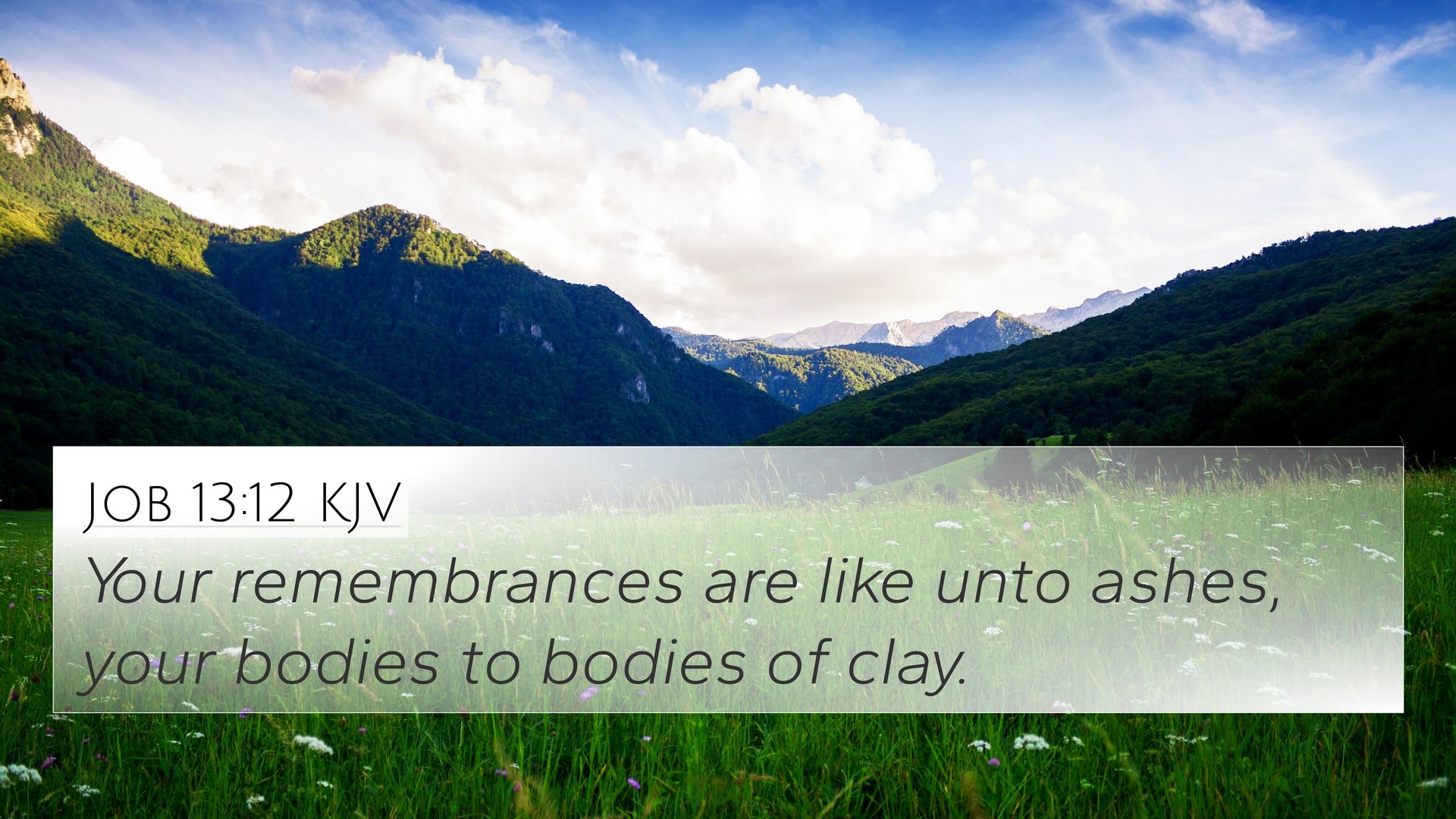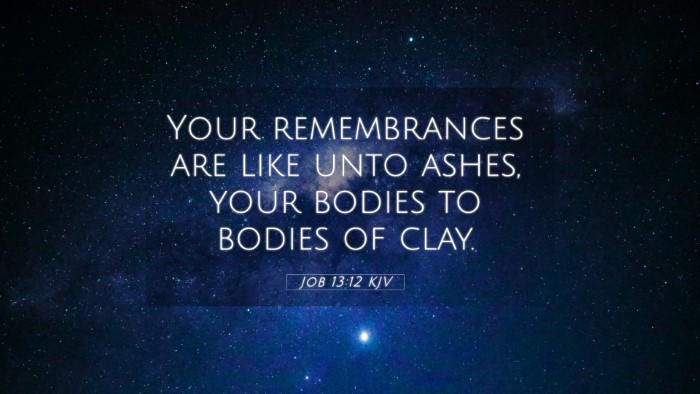Old Testament
Genesis Exodus Leviticus Numbers Deuteronomy Joshua Judges Ruth 1 Samuel 2 Samuel 1 Kings 2 Kings 1 Chronicles 2 Chronicles Ezra Nehemiah Esther Job Psalms Proverbs Ecclesiastes Song of Solomon Isaiah Jeremiah Lamentations Ezekiel Daniel Hosea Joel Amos Obadiah Jonah Micah Nahum Habakkuk Zephaniah Haggai Zechariah MalachiJob 13:12 Similar Verses
Job 13:12 Cross References
Your remembrances are like unto ashes, your bodies to bodies of clay.
Uncover the Rich Themes and Topics of This Bible Verse
Listed below are the Bible themes associated with Job 13:12. We invite you to explore each theme to gain deeper insights into the Scriptures.
Job 13:12 Cross Reference Verses
This section features a detailed cross-reference designed to enrich your understanding of the Scriptures. Below, you will find carefully selected verses that echo the themes and teachings related to Job 13:12 KJV. Click on any image to explore detailed analyses of related Bible verses and uncover deeper theological insights.
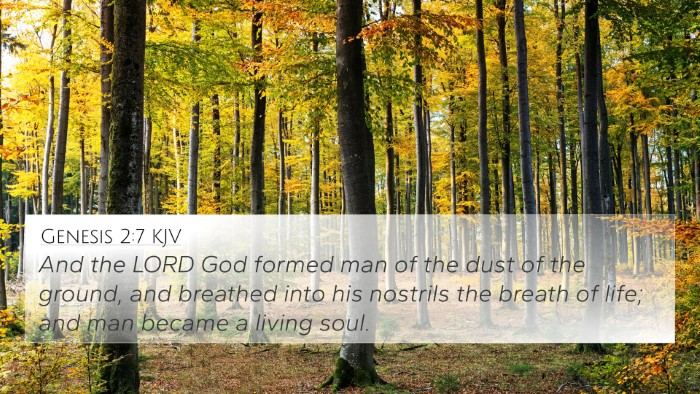
Genesis 2:7 (KJV) »
And the LORD God formed man of the dust of the ground, and breathed into his nostrils the breath of life; and man became a living soul.
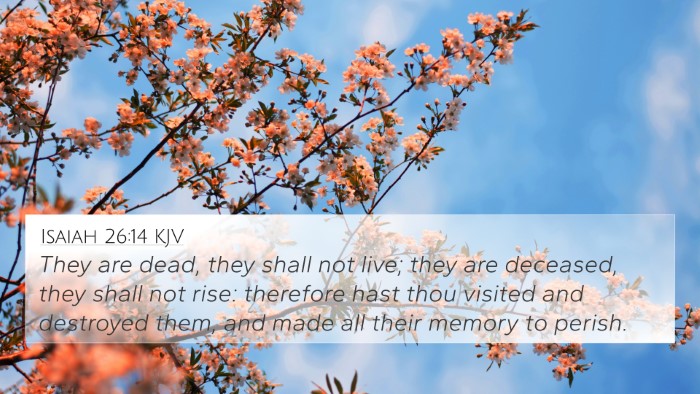
Isaiah 26:14 (KJV) »
They are dead, they shall not live; they are deceased, they shall not rise: therefore hast thou visited and destroyed them, and made all their memory to perish.

Psalms 34:16 (KJV) »
The face of the LORD is against them that do evil, to cut off the remembrance of them from the earth.

Psalms 102:12 (KJV) »
But thou, O LORD, shall endure for ever; and thy remembrance unto all generations.

Psalms 109:15 (KJV) »
Let them be before the LORD continually, that he may cut off the memory of them from the earth.
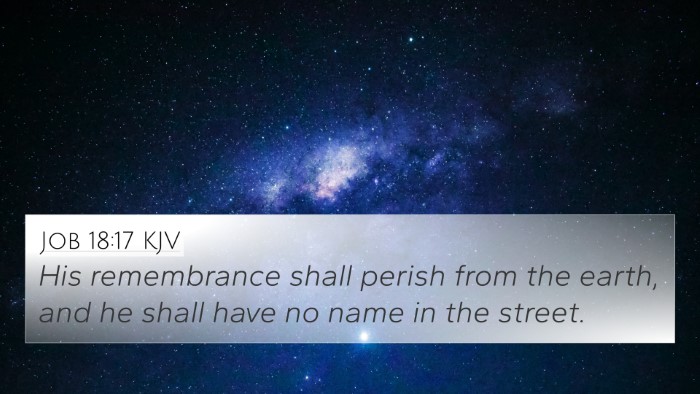
Job 18:17 (KJV) »
His remembrance shall perish from the earth, and he shall have no name in the street.
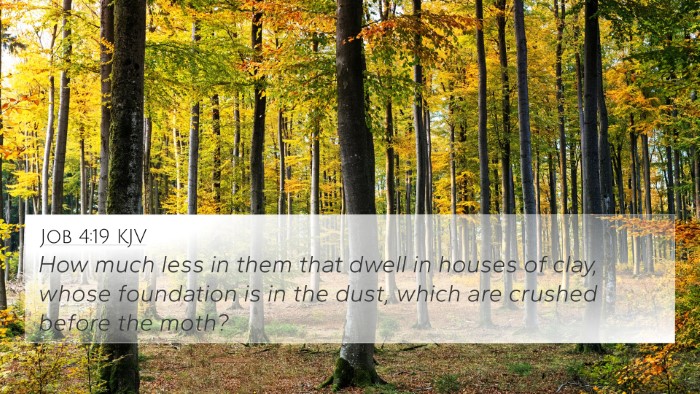
Job 4:19 (KJV) »
How much less in them that dwell in houses of clay, whose foundation is in the dust, which are crushed before the moth?

Exodus 17:14 (KJV) »
And the LORD said unto Moses, Write this for a memorial in a book, and rehearse it in the ears of Joshua: for I will utterly put out the remembrance of Amalek from under heaven.

Genesis 18:27 (KJV) »
And Abraham answered and said, Behold now, I have taken upon me to speak unto the LORD, which am but dust and ashes:

2 Corinthians 5:1 (KJV) »
For we know that if our earthly house of this tabernacle were dissolved, we have a building of God, an house not made with hands, eternal in the heavens.
Job 13:12 Verse Analysis and Similar Verses
Understanding Job 13:12
Job 13:12 states: "Your memorable sayings are proverbs of ashes; your defenses are defenses of clay." This verse captures Job's response to his friends, who have presented their arguments that reflect a superficial understanding of suffering and God's justice.
Verse Analysis
This verse serves as a crucial point in Job's dialogue as he confronts the inadequacies of his friends' advice. In this context, Job highlights the fragility and temporary nature of their arguments, comparing them to "proverbs of ashes" which signifies their emptiness and lack of substance.
Key Themes
- Human Wisdom vs Divine Wisdom: The contrast between the wisdom of men, which Job deems insufficient, and the unsearchable wisdom of God.
- The Fragility of Human Arguments: Job's assertion that his friends' defenses are made of "clay," indicating how easily they can be dismantled.
- Challenge to Traditional Understanding of Suffering: Job pushes back against the commonly accepted belief that suffering is always a result of personal sin.
Commentary Insights
Drawing from insights provided by commentators:
- Matthew Henry: He emphasizes the folly in relying on the wisdom of men when facing profound suffering and divine mysteries. Henry points out that what might seem wise to human understanding can actually be baseless in the sight of God.
- Albert Barnes: Barnes notes that Job’s friends have failed to recognize the complexity of God’s justice. Their simplistic proverbs are likened to ashes, demonstrating their practical uselessness in guiding Job through his afflictions.
- Adam Clarke: Clarke elaborates on the metaphor of clay, suggesting that it easily yields to pressure, akin to how human arguments fail under the weight of genuine experience and truth that Job represents.
Connections with Other Bible Verses
Job 13:12 relates thematically to various other scriptures, deepening our understanding of its message through comparative analysis. Here are some cross-references:
- 2 Corinthians 12:9: Paul speaks of weakness, emphasizing strength in vulnerability, paralleling Job’s struggle against his friends’ interpretations.
- Proverbs 21:30: This verse underscores that no wisdom or understanding can stand against the Lord, echoing Job’s assertion about the limitations of human wisdom.
- Isaiah 40:31: Encourages reliance on the Lord’s strength rather than human understanding, resonating with Job's experience of despair.
- 1 Corinthians 1:25: Paul illustrates the foolishness of God exceeding human wisdom, akin to Job’s rejection of his friends’ arguments.
- Romans 9:20-21: This passage discusses the potter and clay metaphor, which Job uses to illustrate how fragile human reasoning is.
- Psalm 103:16: As a reminder of human frailty, this psalm emphasizes the ephemeral nature of life, paralleling the “proverbs of ashes” in Job.
- James 1:19-20: James advises being quick to hear and slow to speak, which Job wishes his friends had taken to heart.
Thematic Considerations
The themes encountered in Job 13:12 can be further explored through inter-biblical dialogue, which provides insights into suffering, justice, and the essence of divine wisdom. Here are some thematic connections:
- Human Suffering and Divine Response: Exploring how Job’s lament allows for a broader conversation about suffering seen throughout the Old Testament and into the New Testament.
- The Role of Friends and Counselors: Examining scriptures that discuss the responsibility of friends in times of sorrow, contrasting Job’s experience with positive examples from Proverbs.
- Wisdom Literature: Situating Job within the broader context of wisdom literature—Proverbs, Ecclesiastes, and their reflections on the nature of wisdom and suffering.
Conclusion
Job 13:12 serves as a powerful reminder of the limitations of human understanding compared to God’s infinite wisdom. It encourages a deeper exploration of scriptural cross-referencing, revealing layers of meaning that connect Job’s personal anguish with broader biblical themes of wisdom, suffering, and the human condition. By employing tools for Bible cross-referencing, one can discover a holistic view that highlights the interconnected nature of scripture.
